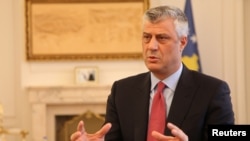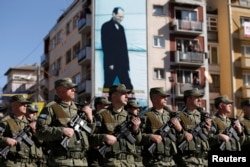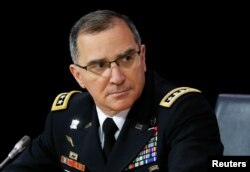In a move likely to anger neighboring Serbia, Kosovo's President Hashim Thaci on Tuesday filed a draft law to convert the country's lightly armed security forces into a national army.
Calling the militarization of the Kosovo Security Force (KSF) “a normal step of a sovereign and independent state,” he issued a statement saying the initiative “aims at protecting territorial sovereignty and integrity, preserving peace and defending the Republic of Kosovo's interests and also contributes in building up and protecting regional and global peace and stability.”
In an exclusive interview with Voice of America's Albanian Service, Thaci called for the support of parliament's ethnic Serb minority, which, he says, is under intense pressure from Belgrade to oppose the move.
“The Serbian List has stated very clearly that it will never vote for the establishment of the Army of Kosovo,” he said, referring to Kosovo's parliamentary ethnic Serb party. “Its attitude is directly orchestrated by the Belgrade government.
“However, Kosovo's fate is not tied to that of (Serbia),” he said. “We are an independent and sovereign state. I want to believe that even if the Serbian List is not willing to vote for the establishment of the Kosovo Army, (it will become a reality). This will be an army not only of the Albanians, but a multi-ethnic army in the service of all.”
'Serbia will never agree'
A series of incidents in recent months has exacerbated long-simmering tensions between Serbia and Kosovo, which declared its independence from Serbia in 2008. The move has been recognized by 114 countries, but not by Belgrade.
“Serbia will never agree with the formation of Kosovo's army,” Prime Minister Aleksandar Vucic said at a rally in Mladenovac on Tuesday, according to The Associated Press.
“We know what Serbia is and what we will never give to anyone,” said Vucic, who is a candidate for president in elections next month.
According to Belgrade-based public broadcaster RTS, Vucic phoned Thaci to “harshly confront” him on the plan, which he said would only further destabilize the region. Both men agreed to continue talks “so that the situation would not escape control."
Serbian Foreign Minister Ivica Dacic said Belgrade will use all political means available to prevent the formation of a Kosovo army. The official Tanjug news agency quoted Dacic as saying Pristina has been making “unilateral moves” fueling instability in the region.
NATO, which has some 4,500 soldiers stationed in Kosovo, said the plan raised serious concerns.
"I made clear that unilateral steps such as these are unhelpful," the Atlantic alliance's Secretary General Jens Stoltenberg said in a statement after talks with the territory's president and prime minister.
The U.S. embassy in Pristina said adoption of the amendments "would force us to re-evaluate our ... longstanding assistance to Kosovo's security forces."
Transformation, expansion
Thaci's plan would boost the KSF's regular forces by 1,000 members to a total of 5,000, and its reserve forces by 500 members to a total of 3,000.
Creation of the new army, he said, is integral to Kosovo's aspiration to join NATO.
“There can be no NATO membership for Kosovo without an army,” he said. “I believe this issue will bring together the political spectrum of Kosovo regardless of their ethnicity or party. All along we have had support from the United States and NATO, but the establishment of the army has become impossible simply because the Serbian List and Belgrade do not allow it. Serbia has threatened the List not to vote in favor of a Kosovo army.”
Citing the army's role as “a factor in peace, stability and good neighborliness,” he said efforts to normalize relations with Belgrade will continue regardless of how parliament votes.
“Kosovo Army is not being established as a threat to anyone, no one needs to feel threatened. On the contrary,” he said. “The dialogue with Serbia will continue and we will work to normalize relations. I also want to hope that this will be a very good message that Kosovo is being consolidated as an independent and sovereign state.”
With domestic political volatility delaying EU membership prospects for some Western Balkan nations, Thaci says Kosovo can't continue to depend exclusively on foreign militaries.
“Because of these EU [enlargement] delays, which are purely technical and bureaucratic, various (kinds of) extremism and nationalism are being born, and there also is a so-called extension of Russian influence in the whole Western Balkans,” he said. “So, Brussels should quicken the pace for the region to be integrated from a strategic point of view.”
Thaci said some 4,500 troops from 31 countries deployed in Kosovo since 1999 will remain. Those international troops arrived after NATO's 78-day air campaign to stop a bloody Serbian crackdown against ethnic Albanian separatists.
Presence of troops assured
Last month, NATO Secretary-General Jens Stoltenberg and Supreme Allied Commander for Europe, Gen. Curtis Scaparrotti, assured Kosovo in separate visits to the country that the military alliance will maintain troops in the country “for as long as it's necessary.”
Thaci's draft law is expected to be submitted for a parliamentary vote no later than next week.
This report was produced in collaboration with VOA's Albanian and Serbian Services. Some information is from AP and Reuters.







